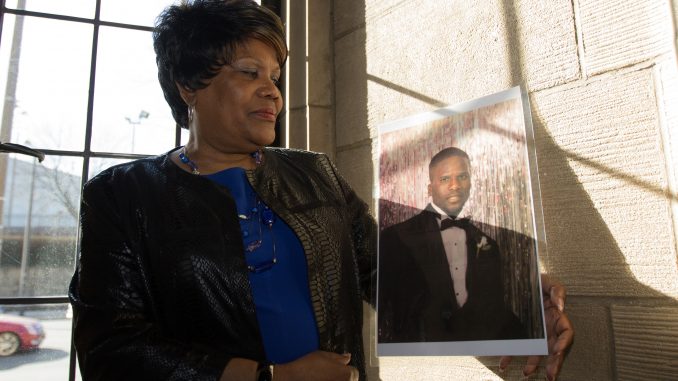
It took a long time for Marvella McDaniel to bury her son. She had everything in order, but couldn’t take the last step—she couldn’t order his tombstone.
“I felt as though I was able to get everything in place and in order, but my mind was messed up,” she said. “That was the last and final step with him. I wasn’t ready.”
In 1996, Eric, 21, was a junior at Temple studying architectural engineering. He had just moved to South Philly with his longtime girlfriend, who was expecting their first child, when he interjected in a fight between his father and a former employee of the family’s business. He was stabbed once in the heart with an ice pick and died minutes after.
McDaniel, a 22-year Temple employee who retired six years ago, attended her first meeting of The Compassionate Friends at Temple University Hospital 20 years ago, closed up and hurt. She left the meeting that day—sharing only her name and Eric’s story—and ordered his tombstone.
Temple’s chapter has met in a basement classroom of the hospital for 27 years and helps loved ones grieve the loss of a child. Since then, family members have come the first Thursday of every month for support.
For newcomers, the group provides a setting where others who have experienced a similar tragedy can share feelings. Recurring members offer support, help with arrangements for their loved ones and talk about new and old experiences.
“As many guests as we have had, there should be more parents or children coming,” McDaniel said. “It’s hard to deal with this alone.”
Since her first meeting, McDaniel has come every month and now, as the group’s leader, helps to see others through the place of pain she was in 20 years ago.
“It took years to get to this place,” she said of her grief. “Don’t put a limitation or a time on it. Don’t say, in two months, three months, I want to get back to my old self. It doesn’t work like that.”
Someone who has lost a loved one never gets over it, McDaniel said, but through it. She said attending meetings helps, if in no other way, to show that progression can happen and life can find some sort of a “new norm.”
One of the mothers who stood out to McDaniel was Donna Garnett, who lost her oldest daughter, Diamond, 23, in a car accident two years ago. When she went to identify Diamond’s body, she received a packet on how to deal with loss and called McDaniel.
It took her 10 months to come, McDaniel said, but when she did, Garnett reminded her of a balled-up fist—tight and tense with everything bottled up inside.
“It was affecting my health,” Garnett said, “I told Marvella I’d love to come to the meeting, but my body wouldn’t let me do it. Finally I said, ‘I’ve got to stop beating myself up. I’ve got to do something positive.’”
Garnett, who has two other children, now talks about her daughter often. Diamond loved kids, Garnett said, and worked for the School District of Philadelphia as a special education instructor. She loved animals and had two pit bulls and a cat, named Coco Chanel, which Garnett still takes care of, even though she is allergic.
“She had a special kind of heart,” Garnett said.
McDaniel said the growth she’s seen in Garnett over the last year and a half prompted her to make Garnett co-leader of the group.
“Once she opened up, it was like, ‘Oh my god,” McDaniel said of Garnett. “She is a light now.”
The pair wants to impress upon the group’s attendees that grieving and working through the loss of a loved one is a slow process. It’s OK to cry or to talk as if their loved one is still here, Garnett said, explaining that no two people process death the same way.
“People say, ‘I don’t want to feel happy because my child is dead.’” McDaniel said. “I want to say, ‘You can be happy, you can laugh and dance. Your child would not want you to feel like this.’”
Garnett hopes that even if it takes a while, people return and realize their purpose in life isn’t gone.
“I just want to lift some of their heaviness,” she said. “I want them to know you can give back through what you have lost.”
Paige Gross can be reached at paige.gross1@temple.edu or on Twitter @By_paigegross.


Be the first to comment